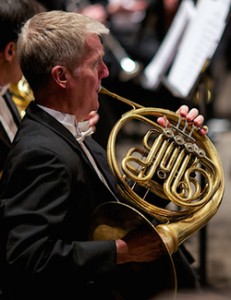
Photo credit: Terry Johnston
It was one year ago this month that our world changed drastically. Many ICSOM musicians were in the midst of rehearsing for upcoming performances when they were instructed to pack up all belongings, go home, and await further instructions. In the weeks that followed, daily schedules were upended. Survival mode kicked in, and many examined the usual steps of their normal routines for revised ways to live safely without possible exposure to COVID-19. Masks were worn and glasses were fogged. We adapted to seeing colleagues and loved ones via Zoom calls. And sadly, we experienced loss.
The most devastating part of the pandemic has been the loss of lives. While the loss of a beloved relative or an esteemed colleague is hard in the best of times, these losses have been even more acutely felt in this time when we have lost so much else—postponed weddings, graduations, contact with others outside our households, and playing music on stage or in the pit with our colleagues. Last fall ICSOM created an “In Memoriam” page on our website to honor and remember our musicians who have passed.
And yet through this tragedy we must have hope. While human beings need basic tangible elements in order to survive, civilization cannot thrive without the intrinsic value that the arts provide. As society continues to make progress in taming this pandemic, inspiring performances from our orchestras and opera and ballet companies will play crucial roles in the next step for moving forward.
Most of us have been fervently seeking some action to take in the face of society’s pandemic paralysis. For some, this has involved socially distanced porch concerts, or playing remotely for hospital patients. For others it has meant pursuing other vocations while they wait for orchestral music to resume. The opera world responded to the pandemic in several ways that were unique to the profession. Some ICSOM opera companies shifted from making costumes to creating and marketing COVID masks—the San Francisco Opera Orchestra musicians have designed masks as well, and are selling them on their website. In Europe, opera singers have been called upon to provide exercises for rehabilitating those who face difficulties in breathing.
As the pandemic grinds on, we need to ready ourselves for what lies ahead. And exactly how do we move forward? The name of this month, which also describes an activity of forward motion, could provide an answer. Recalling my nine years of marching band reminded me that we must move as a group and not as individuals.
My first year of marching band was on the bass drum. The heartbeat of the group, I provided the steady pulse that the entire group relied upon to ground itself as a unit. The following years I played the horn, providing melodic support for a more harmonious ensemble. My final year was as a college drum major. As the leader of the band, I aimed to provide solid guidance while also listening and responding accordingly.
Can any of this be applied to arts organizations? I believe so. From the ground up, all groups need cohesion, team players, and inspiring leaders.
We can look to the tremendous work by the musicians of the Pittsburgh Symphony Orchestra as an example of marching in-step together. Five years ago, the PSO Musicians began the Body & Soul partnership as volunteers for 412 Food Rescue, a local non-profit organization. The PSO Musicians take part by unloading food trucks and performing pop-up concerts. (Note: see “Feeding Pittsburgh’s Body and Soul” in the October 2018 issue)
Of course, all professional orchestras experience cohesion regularly. But the nature of this project—coming together outside of Heinz Hall for the food-insecure populations of their community—has brought that cohesion to a new level.
Whenever we think of a team player, we imagine someone willing to take on the task at hand without complaint. When the majority of a group is participating, you know that there are many team players among them. The PSO Musicians proudly report that they have 100% musician participation in Body & Soul.
Lorien Benet Hart clearly is the inspiring leader behind this project. As shown in her article, “Feeding Pittsburgh’s Body and Soul”, her initiative in finding their partner 412 Food Rescue and organizing her colleagues was the spark that brought this partnership to life.
Today the PSO Musicians are joined by Pittsburgh Symphony staff and board members in this volunteer project, a worthy effort that is recognized by the community. ICSOM’s annual conference is scheduled to be held in Pittsburgh this summer, and I hope that attendees can witness and participate in this fine activity.
American billionaire and philanthropist David Rubenstein, who is chairman of the Kennedy Center for the Performing Arts, stated that, “The world is a complicated place, and there’s a lot of division between people. The performing arts tend to unify people in a way nothing else does.”
A tall order, for sure. But our training, and the experience we have accumulated on the way to attaining our current positions in ICSOM orchestras have made us determined and strong. Using our abilities together seems to be the most logical answer.
Now, march.
Note: the author is ICSOM President.





